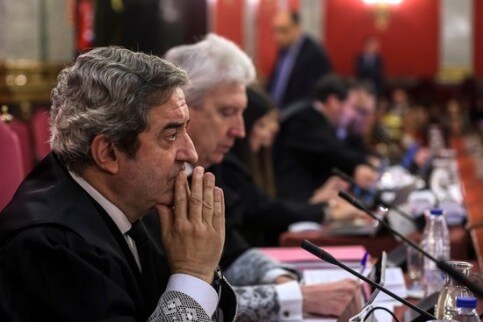Spain’s Public Prosecutor called the 2017 Catalan independence push “a coup d’état” during the closing arguments on Tuesday – at the Supreme Court trial of 12 Catalan political leaders.
Catalan Trial: click here full details of those accused, the charges, and the accusers.
Insurrection, violence, uprising, and coercion. Attorney Javier Zaragoza mapped out the road to independence culminating with the referendum and the declaration of independence, using these terms in an effort to convince the judge that nine of the prosecuted officials should be sentenced to up to 25 years in jail for rebellion.

‘It was a serious attack on the foundations of the constitution with illegal, coercive methods, using violence when needed,’ he said on Tuesday morning.
The prosecutor claimed that leaders in the dock sought to ‘revoke, suspend or modify the Spanish constitution’.
ALSO READ: A UN group demands release of Sànchez, Cuixart and Junqueras
He also described the period between September and October 2017 as ‘insurrectionary’.
Although his arguments applied to all 12 prosecuted pro-independence figures, he especially targeted the Catalan vice-president in 2017, Oriol Junqueras. ‘I believe Junqueras is the main driver behind the referendum.’
ALSO READ: Catalan trial: controversy over ‘rebellion’ and violence
The Catalan president at that time, Carles Puigdemont, is in exile, and therefore not part of the proceedings.
Zaragoza also denied that the nine politicians and activists in preventative detention are political prisoners.
‘There are no political prisoners, they are not political prisoners,’ he insisted.
He also rejected the UN Working Group on Arbitrary Detention’s report urging the ‘immediate’ release of the leaders, questioning its source, and accusing the institution of ignoring Spain’s arguments.
ALSO READ: Jordi Sànchez: ‘Nothing we’ve seen in our trial justifies prison’
With regards the former Catalan Interior Minister, Joaquim Forn, Zaragoza said he should also be found guilty of the charges against him, and that he was also warned against pursuing his actions.
Zaragoza said that that there was a state of exception in Catalonia around the time of the referendum, since the police forces depended on two civilians – activists Jordi Cuixart and Jordi Sànchez – as well as because of the school that were closed and the people that were mobilised.
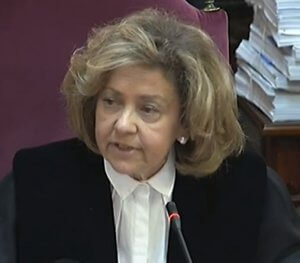
Following Zaragoza’s intervention, Public Prosecutor Jaime Moreno went on to argue that the defendants used violence – as is needed for the charge of rebellion – to advance their goals, downplaying the role of police violence against voters and protestors, which he described as ‘legitimate’ for maintaining the judicial mandate.
ALSO READ: ‘Fairy trap’ goes viral after Enric Millo’s testimony
He also argued that the referendum was not a matter of democracy since voting must comply with the law.
According to Moreno, the defendants instrumentalised violence: ‘There was violence, it was necessary for their cause, the accused knew the vote would provoke confrontations, and yet they still called people to vote knowing what would happen.’
Moreno highlighted the violence against police who sought to prevent the vote on 1 October 2017, as well as the police cars that were destroyed on 20 September 2017. He said that these actions cannot be described as a ‘protest’. Moreno said that all of the defendants knew there was going to be violence on the day of the independence vote.
ALSO READ: Lawyer Ben Emmerson: ‘Spain is acting like a rogue State’
Public Prosecutor Consuelo Madrigal argued that the defendants should be charged with rebellion for the misuse of an estimated 3m euros in public funds.
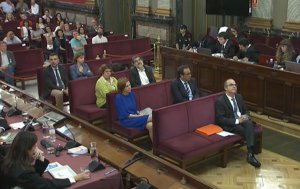
She cited the adverts on Catalan public broadcaster TV3, saying that even if they had been published for ‘free’, they still would have implied a cost to the taxpayer. She also mentioned other illicit payments, such as Diplocat‘s payments to invite ‘foreign observers’ to Catalonia during the October 2017 referendum.
She said that the Catalan Government was fully responsible for the misuse of public funds for the purpose of the independence referendum, violating the Spanish Constitution, and as such argued that the defendants should be subject to rebellion charges.
Public Prosecutor Fidel Cadena argued that the defendants should be charged with rebellion even though a military rebellion did not take place, but because they violated the constitution and the foundations of the Spanish state.
He said that the Spanish government had to send police to Catalonia during the days surrounding the referendum to effectively defend the Spanish state.
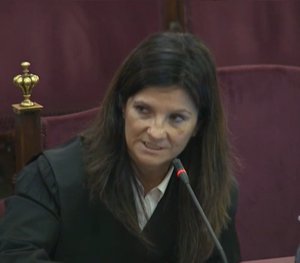
In the afternoon session of the trial, Rosa María Seoane, the Solicitor General, presented her final accusations against the pro-independence leaders. She demanded prison sentences of up to 12 years for the crime of sedition.
The Solicitor General stressed that the trial against the Catalan pro-independence leaders has had ‘full guarantees’ and dismissed claims that their right to defence was undermined during the process.
According to Rosa María Seoane, the independence bid had three main actors: the Catalan Parliament, the Catalan Government, and the civil society leaders.
ALSO READ: Thousands rally in Madrid against Catalan Trial
‘Violence and the use of force can’t be put on the same level,’ said Seoane, justifying why she is pushing for the crime of sedition, and not rebellion. ‘The use of violence was not central to the independence bid,’ she said.
Last of the prosecutors to deliver their summaries and accusations was the far-right Vox party, representing the ‘popular prosecutor’ – requesting prison sentences of up to 74 years for criminal association, misuse of public funds, and two crimes of rebellion.
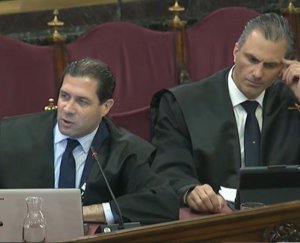
Vox lawyers accused the Catalan pro-independence leaders of carrying out ‘the most sophisticated and original coup d’état against a democracy ever seen in a modern society.’
Javier Ortega Smith, one of the lawyers for far-right Vox, claimed that the accused were part of a ‘criminal organisation’ whose ultimate goal was ‘carrying out a rebellion’ and ‘abolishing Spain’s constitutional order’.
Vox lawyers concluded by saying that they wanted tough sentences ‘so that no one dares to attack the constitutional order again’.
ALSO READ: EU event: Catalan Trial is ‘thanks’ to far-right Vox
At the end of Tuesday’s session in court. defence lawyers demanded more time to present their closing arguments – after the public prosecutors had spent three hours giving their reasons to justify the charges of rebellion. The courtroom president Manuel Marchena dismissed their petition, and confirmed that the lawyers will have one hour to defend each of the accused.
The trial will resume on Tuesday 11 June at 9.30am with the closing arguments from the defence lawyers.
Catalan Trial: click here full details of those accused, the charges, and the accusers.
Click here for all articles and updates on the Catalan Trial
ALSO READ: Catalan Trial: Day 49 summary
ALSO READ: Catalan Trial: Day 48 summary
ALSO READ: Catalan Trial: Day 47 summary
ALSO READ: Catalan Trial: Day 46 summary
ALSO READ: Catalan Trial: Day 45 summary
ALSO READ: Catalan Trial: Day 44 summary
ALSO READ: Catalan Trial: Day 43 summary
ALSO READ: Catalan Trial: Day 42 summary
ALSO READ: Catalan Trial: Day 41 summary
ALSO READ: Catalan Trial: Day 40 summary
ALSO READ: Catalan Trial: Day 39 summary
ALSO READ: Catalan Trial: Day 38 summary
ALSO READ: Catalan Trial: Day 37 summary
ALSO READ: Catalan Trial: Day 36 summary
ALSO READ: Catalan Trial: Day 35 summary
ALSO READ: Catalan Trial: Day 34 summary
ALSO READ: Catalan Trial: Day 33 summary
ALSO READ: Catalan Trial: Day 32 summary
ALSO READ: Catalan Trial: Day 31 summary
ALSO READ: Catalan Trial: Day 30 summary
ALSO READ: Catalan Trial: Day 29 summary
ALSO READ: Catalan Trial: Day 28 summary
ALSO READ: Catalan Trial: Day 27 summary
ALSO READ: Catalan Trial: Day 26 summary
ALSO READ: Catalan Trial: Day 25 summary
ALSO READ: Catalan Trial: Day 24 summary
ALSO READ: Catalan Trial: Day 23 summary
ALSO READ: Catalan Trial: Day 22 summary
ALSO READ: Catalan Trial: Day 21 summary
ALSO READ: Catalan Trial: Day 20 summary
ALSO READ: Catalan Trial: Day 19 summary
ALSO READ: Catalan Trial: Day 18 summary
ALSO READ: Catalan Trial: Day 17 summary
ALSO READ: Catalan Trial: Day 16 summary
ALSO READ: Catalan Trial: Day 15 summary
ALSO READ: Catalan Trial: Day 14 summary
ALSO READ: Catalan Trial: Day 13 summary
ALSO READ: Catalan Trial: Day 12 summary
ALSO READ: Catalan Trial: Day 11 summary
ALSO READ: Catalan Trial: Day 10 summary
ALSO READ: Catalan Trial: Day 9 summary
ALSO READ: Catalan Trial: Day 8 summary
ALSO READ: Catalan Trial: Day 7 summary
ALSO READ: Catalan Trial: Day 6 summary
ALSO READ: Catalan Trial: Day 5 summary
ALSO READ: Catalan Trial: Day 4 summary
ALSO READ: Catalan Trial: Day 3 summary
ALSO READ: Catalan Trial: Day 2 summary
ALSO READ: Catalan Trial: Day 1 summary

